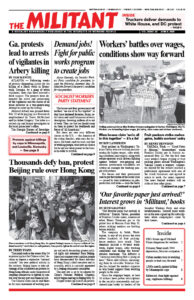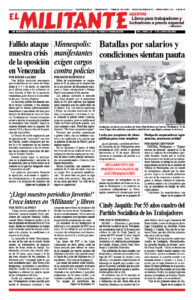YAKIMA, Wash. — “Good News at Monson,” farmworkers’ union Familias Unidas por la Justicia announced May 22. For the first time since workers began striking at fruit packing plants around Washington’s Yakima County a workers’ committee elected by the strikers reached a preliminary agreement with one of the struck businesses and agreed to return to work, the union reported. The news buoyed workers still on strike at four other plants.
“Negotiations with Monson continue over the permanent raise the workers want,” Familias Unidas President Ramón Torres told the Militant. The union has helped the fruit packers organize and fight for their demands. At each plant the strikers have elected a committee to represent them and lead the walkouts.
“They’re negotiating at Frosty Packing,” where the workers remain on the picket lines, Torres said. “We’re still fighting at the other companies. It’s important that the strikes made Monson sit down and negotiate in good faith with the committee that the workers chose. Both sides committed to work and implement everything necessary to have safety and health at work.”
The strikes began over demands for steps to stop the spread of coronavirus in the crowded packing plants. But the workers quickly raised long-standing issues of wages, working hours, work speedup, broader questions of working conditions in the plants, and to be treated with respect.
One demand is for a guaranteed 40-hour workweek. Workers report they are often offered only 20 hours work, but when the bosses need production they speed up the line to the point where fruit is falling on the floor.
“If we’re going to do the work of three people, we want to be paid for three people,” Rosalinda Gonzales, a striker at Columbia Reach Pack, told the Militant. “We want to be treated fairly and with dignity. We need to be paid a decent wage.”
At Monson workers want more than one women’s bathroom in a department where 50 women work.
The strikes haven’t shut down the plants, but they have slowed production, and got the attention of the bosses across this agricultural region. Washington fruit growers and packing bosses raked in some $2.7 billion from fruit and berry sales in 2019. Close to $2 billion of that was from apples alone.
The state’s fruit industry is dominated by integrated fruit-growing and packing combines, increasingly owned by large capital investment funds that have introduced new technologies to speed up production. Allan Brothers, where the strikes started, built a new packing building in 2019 that cost $35 million. Many of area packing bosses, including Allan Brothers and Matson Fruit, where workers remain on strike, are connected through a common marketing company.
The bosses have introduced new orchard technologies, including lashing fruit trees to horizontal suspension cables. That setup costs more than three times as much as traditional orchards to start up, but the trees can start producing in their second or third year compared to four or five for free-standing trees. It also allows bosses to push workers to speed up production.
These conditions helped spur the walkouts. Workers say they are determined to stay on strike until they get contracts. “And Familias Unidas is staying in Yakima until the last strike is over,” Torres said.

